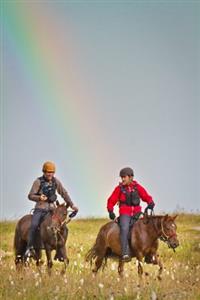The Mongol Derby heads for SABC3 screens in April
Media 162
The Mongol Derby: Race Across the Steppe kicks off on Sunday, 1 April at 20:30 on SABC3, with the series continuing on Sundays.

Cooked in Africa Films was in Mongolia last year to film the world’s longest horse race (Guinness World Records, 2010) as part of its’ second production for The Ride series titled The Mongol Derby: Race Across the Steppe.
Based on Genghis Khan's postal system of the 13th century, the race covers 1 000 km across the Mongol Steppe and saw South African equine adventurers, Barry Armitage and Joe Dawson, compete against 23 accomplished riders from around the world for the 2011 Mongol Derby title. Fellow South Africans, Craig Egberink, Kevin Price-Moor and Paul Erskine also competed, with Underberg dairy farmer, Craig Egberink ultimately winning the race in seven days.
While only 12 riders completed the race, Joe Dawson finished fifth and Kevin Price-Moor finished sixth. Paul Erskine retired from the race after 200km, while Barry Armitage sustained a serious shoulder injury close to the finish that put him out of the running.
Says executive producer, Peter Gird, “The race covered vast and inaccessible distances across the Mongolian steppe, and while Barry and Joe had to battle it out against some of the world’s toughest adventure riders, the production crew also had their work cut out for them keeping up with the action. We deliberately selected a seasoned and highly skilled production team that was used to working under extreme conditions and collectively had amassed hundreds of hours of filming world-class reality TV footage within the adventure genre.”
The Cooked in Africa production team that supported Dawson and Armitrage’s expedition included producer Mark Samuels; director Corne Van Rooyen; director of photography, Sunel Haasenbroek; supported by cameraman, Rob Beugelink; and horse master, Spud Murray.
Says series creator, Barry Armitage, “The extreme physical conditions and distances made this expedition tougher than any horse race in the world. While the horses only ride one section each, the riders felt the full force of ten days of hard riding, challenging navigation and sleeping rough. The Mongol Derby certainly lived up to its reputation!”
The Mongol Derby represents the second horseback TV adventure filmed by Cooked in Africa, and has Armitage and Dawson taking on uncertain odds while retracing celebrated historic equine adventures from around the world. In October 2010, the first show in this Ride Series, titled 'The Ride of the Peacemaker', had Barry and Joe recreate the epic journey completed by Dick King 168 years ago when he rode 960km from the British trading station in Port Natal to Grahamstown, to request help for the besieged British garrison.
Each year, the UK-based event organisers, 'The Adventurists', select and train around 1 000 semi-wild Mongolian horses for approximately 25 riders. In its inception year in 2009, the competition involved 26 riders (from ten countries), 700 horses, 23 horse stations, and lasted for ten days. South African rider, Charles van Wyk and Mongolian rider, Sh.Galbadrakh won the 2009 title by finishing the race on the eighth day.
Each rider that signs up for the Mongol Derby is asked to raise £500 (R6 000) for the organisers’ official charity, Mercy Corps, and a further £500 for a charity of each competitor’s choice. The money raised to fund Mercy Corps Mongolia is directed at improving the lives of numerous Mongolian rural communities and vulnerable groups living in harsh conditions within the region.
Says Armitage, “The race is underpinned by a strong philantophic culture that is expressed by the entrants’ donation of a meaningful sum of money to the event’s official charity and other deserving charities closer to home. While the competition attracts a diverse bunch of adrenalin junkies all intent on reaching the finish line first, we’re appreciative and respectful of the various rural settlements and communities we’ll be riding through on our journey in one of the most beautiful and remote wildernesses in the world.”
Armitage and Dawson selected the Cart Horse Protection Association (CHPA) as their official charity in keeping with their commitment to raise awareness and funds for working horses in South Africa.
About the author
This is only some dummy text because I dont really know what to write. This is only some dummy text because I dont really know what to write. This is only some dummy text because I dont really know what to write.